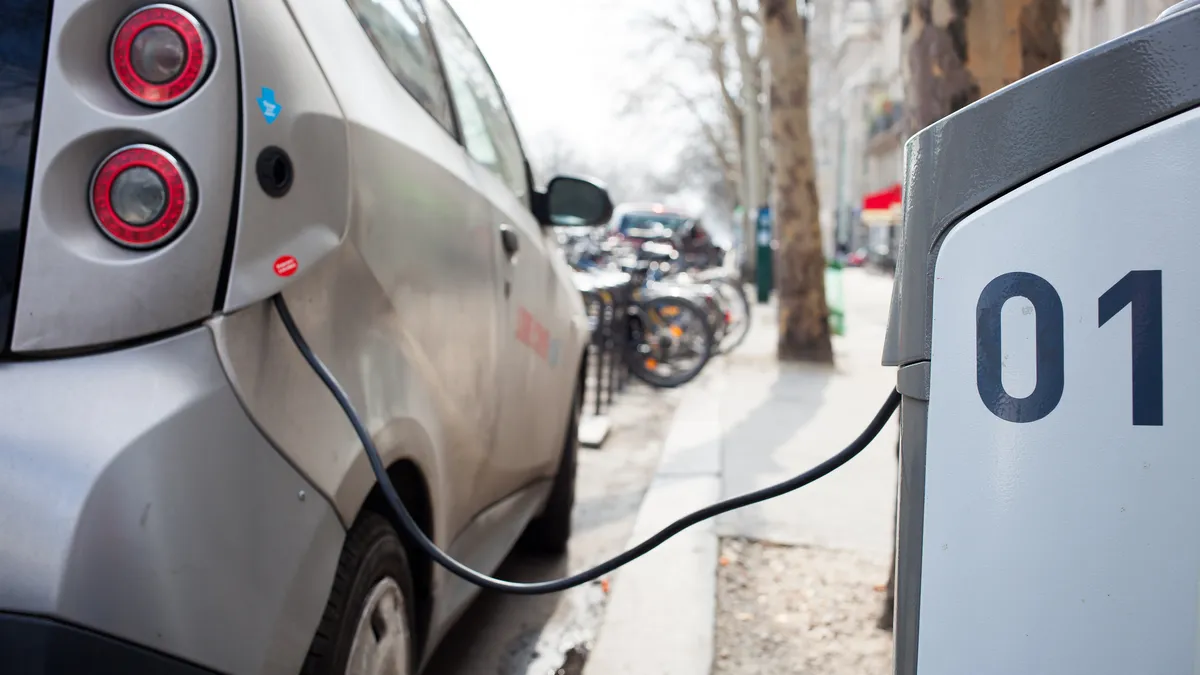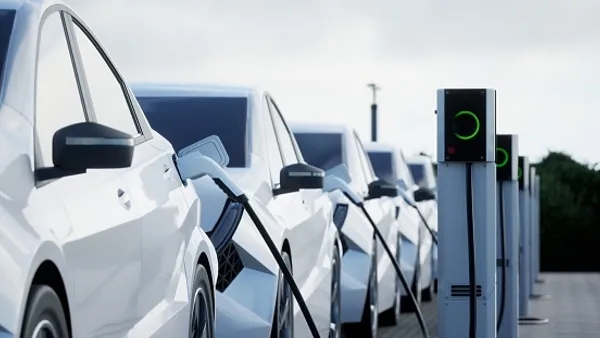Dive Brief:
- The Arizona Corporation Commission (ACC) voted this week to adopt an electric vehicle (EV) policy that encourages investor-owned utilities to develop new rates and pilot programs supporting EV growth, and which ensures they can recover "prudent costs" spent to develop charging stations. Some verbal changes made at the ACC's meeting will be included when a final version of the policy is released in the next few weeks.
- The ACC's policy calls on utilities to propose optional rate design tariffs to encourage off-peak charging, and to develop outreach and education programs focused on EVs, infrastructure and electrification of the transportation sector.
- Emissions-free vehicles are already beginning to gain acceptance throughout the state, and regulators see an opportunity to stake out a leadership role. Tesla competitor Lucid Motors has plans to build a $1 billion EV manufacturing plant in the state, and ACC staff said they see the EV policy as a way to "send a signal to EV manufacturers to locate in Arizona and spur economic development."
Dive Insight:
As utility commissions tackle EV issues, the topic of how to pay for infrastructure is frequent and contentious. And it is a pretty simple argument to understand: why invest in charging stations without any stake in ownership?
Case in point: Arizona regulators just voted 4-1 in favor of the new EV policy, and the last filing in the docket currently comes from a stakeholder relying on a familiar refrain: "I'm writing to ask that you do not raise my electric bill to fund all-electric car charging stations. I should not have to pay for these as I do not own an electric vehicle."
Commissioner Bob Burns said he received more than 90 of these emails.
But the charging stations benefit all customers in a variety of forms, from economic growth to distribution system utilization, say regulators and utilities. The state has worked to attract driverless car development, and is now looking to do the same with EVs.
The policy approved by ACC notes the EV industry is growing rapidly in Arizona, and the state has hundreds of public EV charging stations and thousands of EV vehicles on the road — with both numbers "showing huge growth year-over-year."
ACC staff pointed to nine benefits, from rate designs that reduce peak load to increased grid reliability, lower service costs to consumers, and lower healthcare costs as well.
Plug in America told the commission that some studies have shown EVs can provide "significant benefits" to ratepayers — and specific to Arizona customers, one study showed annual savings of up to $176 per household by 2050, thanks to a 5.5% projected rate decrease.
Katherine Stainken, policy director at Plug in America, says the state does view electric vehicles as an opportunity, but that's not the reason for the EV strategy.
"I do think Arizona wants to attract industry," Stainken told Utility Dive. "If anything, Arizona is catching up to other states that are moving forward with policy guidance. This is a growing area of conversation at national utility regulator conferences."
Tuscon Electric Power spokesperson Joseph Barrios said the utility understands customers are extremely sensitive to any cost increases, and programs are reviewed thoroughly to ensure costs are prudent. But he also said that similar to efficiency programs, which all customers contribute towards, electric vehicles are expected to be a net positive for the system though well-designed rates.
"By reducing the amount of power we have to deliver on peak, that helps to reduce costs, and those lower costs are factored into all customer rates," Barrios told Utility Dive.
"EVs are good for the environment, will save customers money, and help keep more energy dollars in Arizona," Arizona Public Service spokesperson Suzanne Treviño told Utility Dive. And implementation of the state's EV strategies "will help all customers, not just those driving electric vehicles."
Last minute changes
There were some significant "verbal amendments" made to the memorandum before the commission voted, ACC spokesperson Holly Ward told Utility Dive.
Policy statement #8, which focused on second-life battery operations, was removed entirely. It had read: "Public Service Corporations should encourage the utilization and redeployment of used EV batteries for a secondary use."
There is significant interest in the use cases for a stream of used batteries that is expected to appear once EVs take hold at scale. While no longer viable for EVs, the batteries can have up to 70% of their capacity remaining, which has led to multiple car manufacturers partnering with energy companies.
Commissioners also made an important change to statement #5, adding a prudence requirement and some conditional language to the second sentence to finally read: "If the Public Service Corporation deploys EV charging stations, the prudent costs of this infrastructure may be included in rate base.”
The first part of that policy statement says utilities "could deploy EV charging stations" in low-income areas, multidwelling units, interstate corridors or highways, and other areas
Ward says a final commission decision/policy statement will likely be finalized within the next few weeks.
Plug in America's Stainken said the the policy guidance regulators approved "opens the door for utilities to start putting together larger EV programs ... There should be many more stakeholder groups going forward in the new year expanding on the policy and what utilities can/can't do," she said in an email.















